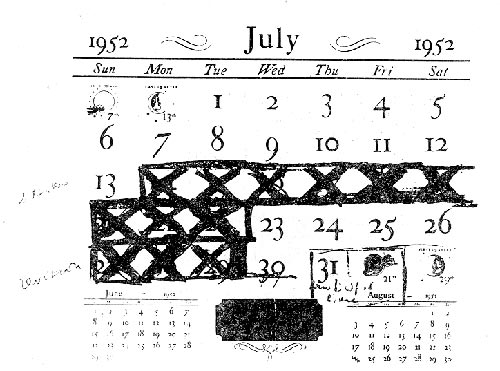So here I go again, once again, trying to roll that rock back up that hill and write a new book.
For someone who’s in that no man’s land where you don’t have an agent, publisher or books on the shelf, you’re left with a few options when you’ve finished a book, or in my case two.
The first is to go back and rewrite, to see if you can get your completed book into some better condition than it was when you finished it. This isn’t without merit. Every time I look over something I’ve written I see places where it could be better or things I don’t like anymore so rewriting has a value. However rewriting can become an endless cycle. Without some outside direction it’s possible to keep rewriting forever, endlessly telling yourself that the book isn’t finished yet because you keep going back and tinkering with it. Like a literary version of the Forth Bridge you get to the end and it’s time to go back and start again (though I believe, fact fans, that they’ve now started using a new paint on the Forth Bridge that doesn’t require constant repainting but for the sake of argument we’ll stick with the older version, or insert the name of a constantly repainted bridge at your leisure). Constantly rewriting is also a way of putting off that day when you send your book out into the world and look for approval, you can’t submit a book and say in the email that this may be draft 36 but if they email back you can now send them draft 48. Essentially you need to shit or get off the pot, to put it bluntly. There is only so much you can do on your own. I truly don’t believe that an agent will reject your book because they feel it could do with another draft. As has happened to people I know the agents have come back to the writers, offered encouragement and advice and requested the rewrites and moved on from there. Everything they get will be rough in one form or another. You give it the best shot you can and send it out, the alternative is you keep rewriting and rewriting and fill your life with unfinished manuscripts.
The second alternative is to move on to another book, this is what I prefer to do. This probably comes from the way I write. I’m a planner, a plotter, a thinker, a note-taker. When I get an idea for a story I generally think through things like the characters, the plot, even the general feel of the story before I start writing. I normally know the beginning and the end and most of what happens in between and why. This makes the process of writing much easier for me as I’m effectively typing something I already know instead of sitting staring blankly at the screen wondering what comes next. For this reason I like to move on to another story, a short story maybe or in this case another novel.
Unfortunately this isn’t as easy as it sounds. I prefer to write in the first person, to get inside the main character’s head and tell the story from there. I heard the term ‘voice-book’ used by someone else and I think I’ll borrow it. I write voice-books, but it can mean writing them can be uncomfortable places to be, even if you know exactly what’s going to happen and can type away as fast as you can without having to pause to worry about what happens next.
Take my new story for example. It’s about a man whose girlfriend has been murdered. I’m roughly 10,000 words in but basically the work so far encompasses the initial shock, grief and despair, not a pleasant place to be. As the story unfolds a secret will come to light that will change how both the protagonist and his girlfriend are seen and sets the story down a particular path, but that’s another days work, I need to get through these parts first before I can move on. I prefer the linear approach, start, middle, end, as there are often little things that creep in that colour the text as it goes on. That, as they say, is the plan anyway. If I keep on track I should have a finished draft of this new book by the end of the year. My target is the Irish Writers’ Centre Novel Fair competition which is useful not only for the chance it offers but because I work much better with a target, a deadline, or to get all Chandlerish for a moment I don’t know what to do until that man walks through the door with a gun and points it at my head.
There is, of course, a third option, that is to throw my hands in the air, admit I’m a failure, wipe my hard-drive and never write another word. Maybe I could take up a more socially acceptable hobby, like alcoholism, or cow tipping? Despite the occasional pangs I’m not ready to be a failed writer just yet. The word ‘failed’ implies finality, a full stop. Perhaps in my case the term ‘failing-writer’ is more appropriate, though of course that leaves me in the ‘fail again, fail better’ category and I’m always happy in such company.
Working to a plan and a schedule as I do is, of course, just a pale imitation of the master of working in this manner, Georges Simenon, the great European crime writer and one of the greatest writers of them all. Reading his books is a great pleasure for me but also a humbling experience, especially when you see the pace at which the man churned out such fantastic work. If you haven’t read any of his books I urge you to immediately turn off this drivel and get your hands on them, especially the non-Inspector Maigret stories. Someday, if I feel I have the chops to do it, I intend to write a blog post about Simenon’s work, maybe a series dedicated to each of my favourite crime writers? But not today (quickly scribbles ideas for future blog posts).
Simenon is a legendary writer, as Luc Sante put it in the introduction to The Man Who Watched Trains Go By, nyrb, 2005;
The legend of Georges Simenon expresses itself in statistics: four hundred books, ten thousand women, half a million pencils, some exalted quantity of pipes.
And of course if I could go to that hole in the ground having written a percentage of the books he has I would be a very happy corpse, a percentage of the number of women would also be very much appreciated as you’re offering (where are the dudes with the horns, cloven feet and contracts when you need them?), though I’m pretty ambivalent about the pencils to be honest and the pipes you can keep.
The speed at which he wrote was astonishing, I always remember a picture taken from a biography I read showing a page from one of his calendars. Carefully marked off were nine days for writing, a pause, and then three days for revision. AND THAT WAS IT. Many writers have struggled for much longer time and completed something not even a fraction as good as the books Simenon could just knock out. So every time I start to plan out a book I have that page from his calendar in my head. Even if I had the time to do so and didn’t have to worry about little things like a full time job I know I’d never be able to finish a book in that short a time.
But it’s like someone who plays five-a-side football with his mates looking at YouTube videos of the Brazilian team of 1982, sometimes it’s important to sit back and admire those who raised the bar, even though you might never get within a million miles of it you know you have something to aim for.
You can read shite, aim low and try to copy it but can you look yourself in the eye while doing it?
So I start pushing that rock back up that hill again. And though the top of the hill is the standard set by those I regard as great and though I know I’ll never reach the top of that hill I’ll keep pushing.
. . . It sure beats the shite out of sitting at home every evening watching reality TV now doesn’t it?


I wish you the best of luck, C.O.S., even though you are WRONG. Option one is correct. Option one, dammit! Option two I suppose is possible, but wrong. Option three is unthinkable. So don’t think it.
I did forget to mention that staying on option one is much more likely to lead me directly to option three so I’ll stick with the second option if you don’t mind (besides, what would you published authors know anyway . . .)
You’ll have a load of work done by the time you get your first book published, then you’ll be able to keep them all in the air as you write more. You could even become a genuine full time writer. Enviable. My calendar for a book is three years, takes me four weeks to write a page sometimes.
I still fancy your chances to be on the shelf first Miss B.
First one published buys the booze!
As a songwriter I can see so many similarities in your struggle. I usually work an album at a time. In all fairness it is easier to break it to smaller blogs by doing a song at a time. But in the past six months I completely change my work method. As you mentioned your schedule, I set my self a deadline by when the recording must be sent to Mastering. In the past I had one album that took me two years to finish, and was it any better than some of the ones I had made in few months? No. Things became over polished, and the rough edges that sometimes give you the character, were completely gone. I know every one is different, but for me having a deadline has worked wonders. The result might not be “perfect”, but it is out and I will move on to the next project, which of course is also your preferred second option.